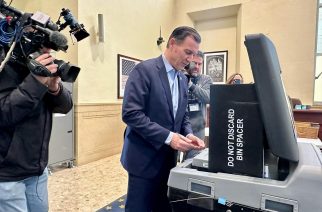
The New York State Senate recognized the month of April as “National Donate Life” month. Legislation is in the works and the house also passed a resolution to get more New Yorkers to become organ donors.
A collection of bills, drafted in hopes of increasing the number of New Yorkers on the state’s Donate Life Registry, have passed the Senate and are currently awaiting Assembly approval. As of today, New York has the second lowest rate in the nation of citizens registered to be organ or tissue donors, with only 25 percent of its residents enrolled in the registry.
These five bills are meant to improve multiple aspects of organ donation in New York. The first bill (S.7003) in the cluster would ensure that New York’s youth is getting properly educated on what it means to be an organ donator. While the current age of consent to register for organ, tissue or bone marrow donation in New York is 18, blood donation is 17, or 16 with guardian consent, but many young New Yorkers are not knowledgeable enough to make such a big decision once they reach legal age.
The bill, sponsored by Senate Majority leader John Flanagan, would require state education officials to develop lessons and recommendations to educate high school students about the life-saving benefits of becoming a donor.
Flanagan believes that this piece of legislation would help high school students make informed decisions when they reach the legal age.
“No one ever wants to be in a position of needing a life-saving transplant for themselves or someone close to them, but it is critical that we increase the number of donors to give more people a chance to survive,” Flanagan said.
Republican Sen. Kemp Hannon, chair of the Health Committee, is sponsoring two companion bills to Flanagan’s that would increase participation in the Donate Life Registry. New York is currently one of four states in the country to require an individual be of 18 years or older in order to donate. Bill (S.5313-a) would lower the age of organ donating consent in New York to the age of 16.
Bill (S.6952-a) would ensure that all New Yorkers get an additional opportunity to document their decision to enroll in the registry. This would grant any New York resident applying for health insurance through the state health benefit exchange the space to register for organ, eye and tissue donations through the Donate Life Registry.
Sen. Hannon urges that this legislation get passed, so more lives can be saved.
“According to the New York Alliance for Donation, 1,700 New Yorkers have been on a waiting list for more than five years,” Hannon said. “As a state we must and can do more to ensure those in need of organs can be saved through transplantation. This legislation we passed, will help increase the number of people on the Donor Registry and save lives.”
Bill S.6528, sponsored by Democratic Senator David Carlucci, makes “Lauren’s Law” permanent in the state of New York. “Lauren’s Law,” named after 12-year-old heart transplant survivor Lauren Shields from Stony Point, New York, prohibits a driver’s license application from being processed unless the organ donation section has been filled out. While this will not necessary encourage more people to register, it guarantees they at least have to consider it.
In addition, bill S.7013-a, would add human organ delivery vehicles to the list of authorized emergency vehicles in the state. This would ensure the safe and speedy transportation of life-saving organs to and from their destinations. Sponsor Susan Serino believes this legislation is plain common sense.
“When lives are on the line, you cannot afford to waste a single second. This common sense legislation will ensure that those who are in like for the organs they need to survive do have to watch the minutes tick by as their organs sit in traffic… I urge my colleagues in both houses to make it a priority,” said Serino. “If you have ever met someone who has been on a wait-list for an organ, then you know they’ve waited long enough.”
All five bills have passed the Senate and await consideration in the Assembly.









